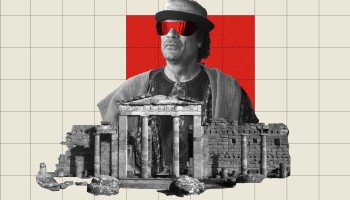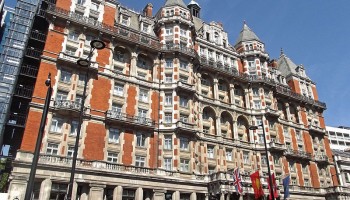“The cancerous effects of illicit financial flows and corruption on the socio-economic development of countries are glaringly evident,” Buhari said in a speech delivered at the inaugural Paris Peace Forum, attended by some 70 world leaders and international nonprofits.
Buhari, a former military ruler whose 2015 election win made him the first Nigerian to defeat a sitting president, reasserted his administration’s commitment to the fight against corruption, one of his primary campaign issues.
“We continue to demonstrate zero tolerance for corrupt practices and non-conformity conduct in public life, by confronting corruption head-on,” he said on Sunday.
He noted that the federal government’s new whistle-blowing policy, designed to encourage the public to report violations of financial regulations, has recovered “billions of Naira from corruption persons and companies.”
Jail time, however, “is not sufficient to deter perpetrators” of graft, Buhari said. Recovery of assets and property acquired through illegal methods is the only method to stem corruption, he continued.
Buhari assured the international community in Paris, however, that “our efforts at fighting corruption are firmly within the limits of the rule of law, in spite of the interest-forcing strategies of those who chose to discountenance the fundamental value of compliance with the laws of the land.”
Although Buhari’s term has seen high rates of corruption convictions - 603 between his inauguration and this May - and the recovery of an estimated US$1.4 billion in stolen public funds, corruption watchdogs have noted that Nigeria is actually moving backwards when it comes to corruption.
“Where institutions of accountability are not working well, such cases [of recovered stolen public money] pose a complex problem: how to make sure that the money is not embezzled again, and actually benefits the real victims of corruption – the ordinary people whose state finances were plundered,” Transparency International wrote in a feature about asset recovery published this August.
Presidential elections are scheduled for February, but an October poll showed that 60 percent of respondents did not feel Buhari deserved a second term in office. The opposition has accused him of turning the administration into a dynasty run by a “cabal” of his close advisors in the cabinet - whom Buhari took six months to appoint, earning the nickname “Baba Go Slow.”
Buhari, 75, has also been plagued by severe health problems, prompting several trips to London hospitals, but refuses to disclose the nature of his illness.
But even after numerous calls to step aside, he plans to run for re-election in February, facing off against former vice president Atiku Abubakar, who this Sunday accused Buhari of ordering security agents to harass him at the airport in Abuja after he got off a flight from Dubai.
Despite the challenges Buhari will face in the election, he remains optimistic.
In a speech celebrating Nigeria’s 58th independence day this October 1, he said that there are no “quick fixes” or “short cuts” when it comes to building a democratic state.
“We know we are on the right path,” he assured citizens. “Our journey is not finished but we have come a long way.”






